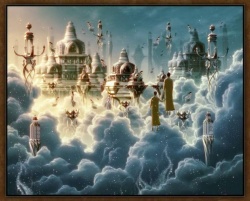Difference between revisions of "5.The Four Sights"
m (Text replacement - "mortal" to "{{Wiki|mortal}}") |
|||
| Line 2: | Line 2: | ||
[[King]] Suddhodhana took every precaution to prevent [[Siddhattha]] from any [[sight]], which could inspire him to become an [[ascetic]] ever since he was born. | [[King]] Suddhodhana took every precaution to prevent [[Siddhattha]] from any [[sight]], which could inspire him to become an [[ascetic]] ever since he was born. | ||
| − | When {{Wiki|prince}} [[Siddhattha]] was twenty-nine, the [[devas]] felt that it was [[time]] for him to attain [[Enlightenment]]. So, they instilled a [[desire]] in his [[heart]] to visit the park. On the way, he encountered an old man, who wass walking with the help of a stick. Shocked with the stark [[reality]] - that everybody becomes old and no | + | When {{Wiki|prince}} [[Siddhattha]] was twenty-nine, the [[devas]] felt that it was [[time]] for him to attain [[Enlightenment]]. So, they instilled a [[desire]] in his [[heart]] to visit the park. On the way, he encountered an old man, who wass walking with the help of a stick. Shocked with the stark [[reality]] - that everybody becomes old and no {{Wiki|mortal}} can escape it - he returned home in serious mood. |
When the [[king]] learnt of his [[mental]] shock he made every [[object]] of [[mundane]] [[pleasure]] available to his son.. Nonetheless, the {{Wiki|prince}} was not interested in the [[worldly]] [[pleasure]]. Next day, he again went to the park. There he saw a sick [[person]]; and felt that disease too, is a [[reality]] of [[life]], which no one can escape. On the third day, he saw a corpse; and realised that [[death]] is another [[reality]], which no one can escape. [[Thus]], he realised the triviality of the [[mundane]] [[life]], which is bound to crumble; because if one is born one would undergo the process of [[ageing]], [[sickness]], [[death]] and all kinds of [[suffering]]. Even the mightiest of all monarchs are not capable of overpowering those [[realities]] of [[life]]. | When the [[king]] learnt of his [[mental]] shock he made every [[object]] of [[mundane]] [[pleasure]] available to his son.. Nonetheless, the {{Wiki|prince}} was not interested in the [[worldly]] [[pleasure]]. Next day, he again went to the park. There he saw a sick [[person]]; and felt that disease too, is a [[reality]] of [[life]], which no one can escape. On the third day, he saw a corpse; and realised that [[death]] is another [[reality]], which no one can escape. [[Thus]], he realised the triviality of the [[mundane]] [[life]], which is bound to crumble; because if one is born one would undergo the process of [[ageing]], [[sickness]], [[death]] and all kinds of [[suffering]]. Even the mightiest of all monarchs are not capable of overpowering those [[realities]] of [[life]]. | ||
Latest revision as of 20:42, 12 September 2013
King Suddhodhana took every precaution to prevent Siddhattha from any sight, which could inspire him to become an ascetic ever since he was born.
When prince Siddhattha was twenty-nine, the devas felt that it was time for him to attain Enlightenment. So, they instilled a desire in his heart to visit the park. On the way, he encountered an old man, who wass walking with the help of a stick. Shocked with the stark reality - that everybody becomes old and no mortal can escape it - he returned home in serious mood.
When the king learnt of his mental shock he made every object of mundane pleasure available to his son.. Nonetheless, the prince was not interested in the worldly pleasure. Next day, he again went to the park. There he saw a sick person; and felt that disease too, is a reality of life, which no one can escape. On the third day, he saw a corpse; and realised that death is another reality, which no one can escape. Thus, he realised the triviality of the mundane life, which is bound to crumble; because if one is born one would undergo the process of ageing, sickness, death and all kinds of suffering. Even the mightiest of all monarchs are not capable of overpowering those realities of life.
Next, on the full-moon day of Asalha he saw an ascetic. Curious, he asked his charioteer Channa about the identity of the person. Channa then informed him that the person was an ascetic, who had renounced the world in pursuit of eternal bliss. He also praised the ideals of an ascetic. The ascetic’s resolution to renounce the worldly life in quest of the truth infused greater happiness in his heart and inspired him to lead the life of an ascetic.Upon his return to the city, he received the news of the birth of his son Rahula. When advanced further to the palace to see his newly born babe, he heard the royal lady Kisagotami singing out of joy at his graceful appearance. The song - “Nibbutta nuna sa mata” is very popular and is identified as Nibbuta Pada in the tradition. The word Nibbuta, which referred to the delivery of the mother in the above statement was interpreted by Siddhattha as ‘Deliverence’ from the webs of worldly life. Rejoicing at the song Gotama took off his pearl necklace and sent it to the lady as a token of gratitude for having sung such a song.
